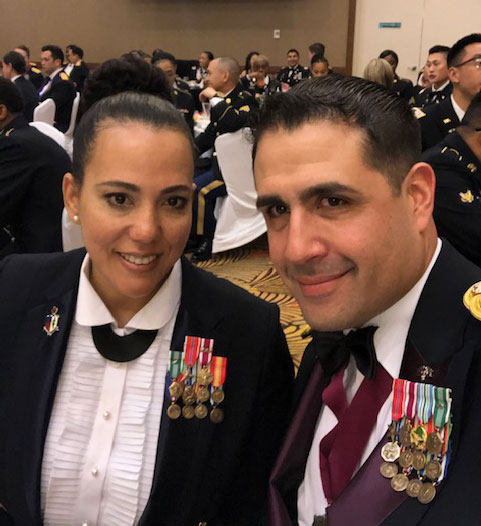Retirement Close, Rivera Looks Back on a Lengthy, Accomplished Career

Sgt. Maj. Nubia Rivera of the U.S. Army Medical Research and Development Command finds herself in a bit of a pickle. With less than 48 hours before she takes the stage at her own retirement ceremony on August 5, she's still trying to formulate her speech – still trying to figure out the right words to summarize a more than 25-year Army career.
"Right now I have so many things in my head," says Rivera, laughing as she stares at her pages and pages of notes. "There's just so much I'm thinking about right now."
There's certainly a lot of ground to cover. Originally born in the Dominican Republic, Rivera emigrated to the U.S. in 1989 to join her parents, who had emigrated themselves two years prior. Just 14 years old at the time, Rivera and her two siblings – along with other family members who made the move – settled in Miami, Florida. After graduating high school and taking a position at a local bank, Rivera joined the Army in 1997 as a way to pay for college. Her first assignment was a three-year stint in Germany as a healthcare administrator.
"I loved it," says Rivera, who had initially planned on just a few years of service time. "I loved my time in Germany. I loved everything we did as Soldiers. But then I realized that I had just come in – and now all of a sudden it was time for me to leave."
Her resolve renewed – and perhaps eager for a little more adventure – Rivera came back to the U.S. for a brief assignment at Walter Reed National Military Medical Center before spending the next two-plus decades hopping from the nation's capital to Texas to North Carolina to Korea and all points in between. Somewhere in the middle, during an assignment at Fort Belvoir, she met her husband, Chief Warrant Officer Carlos Rivera, who now serves as the director of the Medical Maintenance Management Division at the 6th Medical Logistics Management Center. More importantly, it was during that time – in true Army fashion – where she learned about herself and, consequently, her capacity to set an example for others.
"I learned that I'm very resilient, that I have the ability to fall and pick myself up and move on," says Rivera, highlighting one of the key lessons she's learned over her career. "I learned that I can bounce back and continue with the mission and not have anything fall through."
"I remember her being very adamant that she wanted to leave at the end of her initial four-year assignment," says retired 1st Sgt. Alvin Scroggins, an old friend and mentor who worked with Rivera at WRNMMC. "I told her that she was the kind of Soldier who needed to stay in the Army for the long haul."
Indeed, Rivera credits Scroggins as a defining force in her professional career; not just someone who encouraged her to stay, but rather a guiding voice who implored her to refine her life's mission through service. Rivera's assignment to USAMRDC in 2020 serves as a capstone to that commitment. For his part, Scroggins will deliver remarks on Rivera's behalf at her retirement event.
"She is very, very good quality Soldier," says Scroggins, who retired after a 22-year career in 2005. "I knew that when she first reported. Every job she had, she was no-nonsense. That's how I knew she would be a great leader."
More than anything, Rivera is now keen to pass along as many pointers as she can, as many 'lessons learned' to the next group of leaders – particularly rising female leaders, she notes – before she exits for good. More often than not, her advice tends to be far more people-oriented than anything else ("Take care of your Soldiers and they'll take care of you," is one of her favorites). That sentiment dovetails with the Army's own tenet directing that people are, by far, the military's greatest resource.
For now, however, as she stares down her last hours of service, Rivera's future is still very much up-in-the-air. She'll take at least a month to kick up her heels and relax with her three children, she says, before making any long-term plans. For now, she's content to take stock of the work she's done – and the impact she's made – over the past 25 years.
"If you come into any organization and, at the end, you can look back knowing that you've made a difference, you've accomplished something in life," she says. "I'm leaving knowing that I've made a difference – and that to me is an accomplishment."
 An official website of the United States government
An official website of the United States government
 ) or https:// means you've safely connected to the .mil website. Share sensitive information only on official, secure websites.
) or https:// means you've safely connected to the .mil website. Share sensitive information only on official, secure websites.


